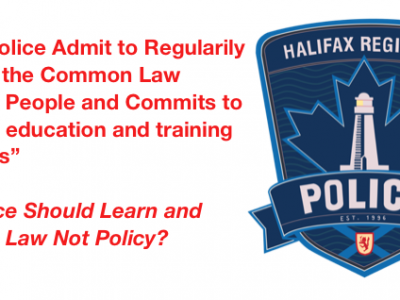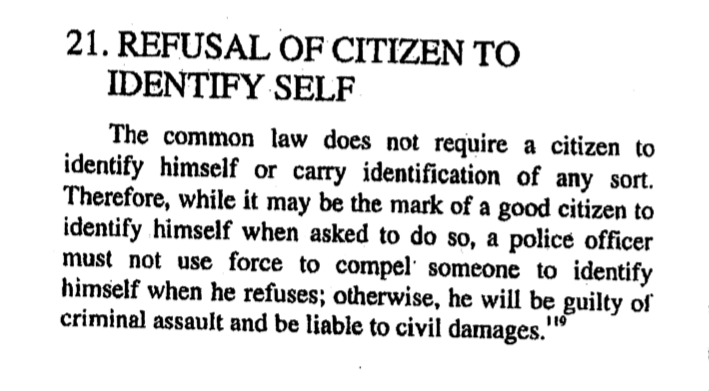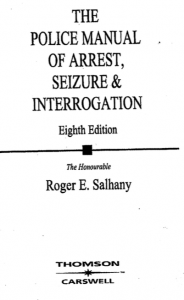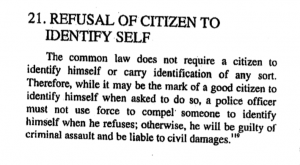

At Common Law No ID Required – Police Cannot Even Ask for ID
Do you need to present ID when asked by police (vs peace officer)?
- Generally No!
Can a police officer even ASK you for ID?
- Generally No!
It depends on the context of the situation.
The following is an oversimplification but gives the principles…
Are you, at the time police ask for ID, a regulated person, in a regulated activity? (therefore you are not at common law, you are subject to an Act that you filled out an application for). Then, yes you are, at that moment (not always), a regulated person in a regulated activity ie. a Driver, operating a motor vehicle.
At common law one is not a regulated person, nor in a regulated activity. ie. a private person in private activity
If you are, at the time, not a regulated person, not in a regulated activity, you are at common law and then no, you do not have to provide ID…and police cannot even ASK you for identification. At common law, the only time you can be even be asked and need to provide ID is when you have harmed or threatened of harm to person or property, with a officer or witness having seen you commit a crime.
Unless the officer actually observed the accused committing an offence known to law, there was no right to ask the person to identify…
Source: The Police Manual of Arrest, Seizure and Interrogation
The contextual questions one needs to pursue are:
-
what is a regulated activity?
-
is one a regulated person within that regulated activity?
-
In addition it is good to know, how did one become the regulated person?
There is a very specific situation where police cannot even ASK you for identification as stated in Canadian The Police Manual of Arrest, Seizure and Interrogation handbook for police, at common law.
The recent 11th edition (and proceeding 8th) have the same statement and case law references:
11th edition page 126-128
section 22. REFUSAL OF CITIZEN TO IDENTIFY SELF
[excerpts]
The common law does not require a citizen to identify oneself or carry identification of any sort. therefore while it may be the mark of a good citizen to identify oneself when asked to do so, a police officer must not use force to compel someone to identify oneself if he or she refuses, otherwise, the officer will be guilty of criminal assault and liable to civil damages Koechlin v Waugh-refuse ID-1957canlii359 PDF
…
However, the common law has never considered it an offence of obstruction for a person to refuse to identify oneself and thus prevent a police officer from carrying out his or her general duties to investigate crimes.
…
Rice v Connolly [1966] “there is no legal duty to that effect [assist police], and indeed the whole basis of the common law is the right of the individual to refuse to answer questions put to him by persons in authority, and to refuse to accompany those in authority to any particular place; short, of course, of arrest.
…
…a willful obstruction required that it not only be intentional but be done without lawful excuse. Unless the officer actually observed the accused committing an offence know to law, there was no right to ask the person to identify herself or a reciprocal duty on the part of the citizen to do so.
Source: The Police Manual of Arrest, Seizure and Interrogation 11th Ed. pg. 126-129
Case law referenced:
- Koechlin v. Waugh and Hamilton, 1957 CanLII 359 (ON CA), <http://canlii.ca/t/gwdc2>
- R. v. Guthrie, 1982 ABCA 201 (CanLII), <http://canlii.ca/t/2f05k>
- DOWNLOAD PDF EXCERPT PAGES:
- NEW Salhaney’s Police Manual of Arrest, Seizure and Interrogation 11th ed. pg 126-129
- Salhaney’s-2015-ID-Refusal of citizen to Identify Self-11th-Ed
When reviewing this excerpt from the Manual pay close attention to the selective and intentional use of police officer versus peace officer and officer.
- A peace officer is a common law office, there are no statutes, only principles of law guided generally by “do no harm or threat of harm to person or property” – keeping the peace.
- A police officer enforces offences under statutes, a policy enforcer – collecting fines/taxes for offending an Act
- An officer is neutral and can be either a peace officer or police officer.
- The first office is a peace officer, the second is a police officer. Always good to know which office the officer is exercising…peace (common law) or police (policy/statutes)
DOWNLOAD PDF excerpt – Older Version Police Manual-ID-search-arrest-seize 8th Ed


